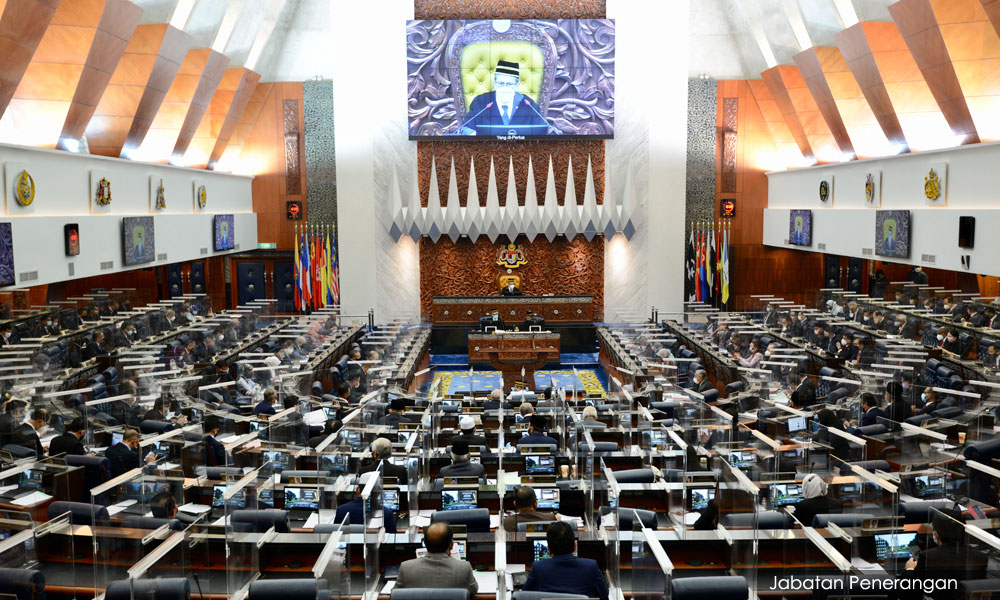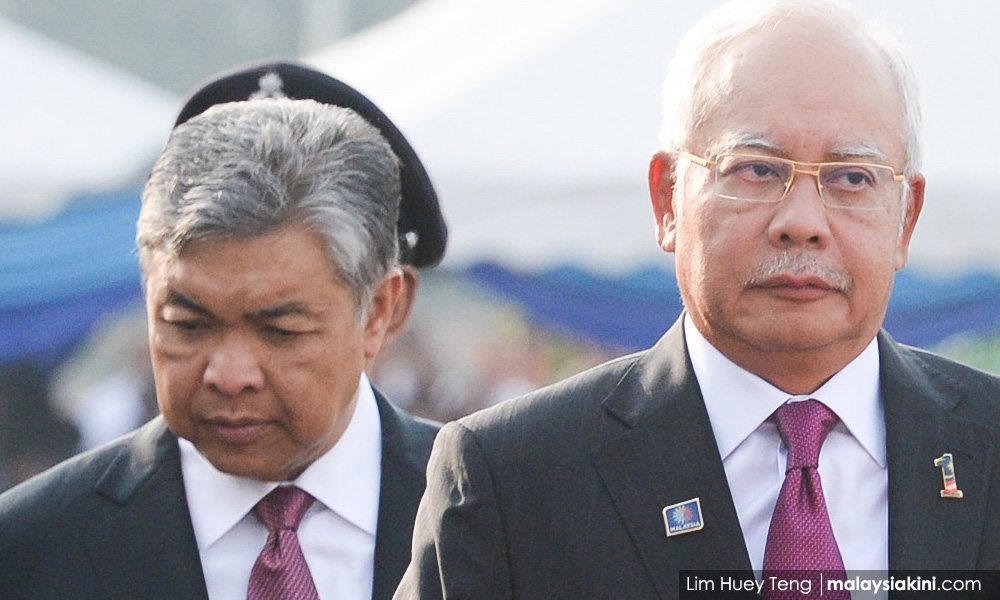So, after all the dramas and rumours, Ismail Sabri Yaakob finally becomes Malaysia’s ninth prime minister, the third installed in three years and four months.
Ismail’s rise is met with an online petition against it that has registered 350,000 signatures so far and predictions that his term would be shorter than Muhyiddin Yassin’s 17.5 months.
Counter-intuitively, he might have two advantages that he can exploit.
First, because the public and the palaces have no stomach for any regime change, members of his fragile coalition cannot threaten to pull out, and he has greater room to manoeuvre. Second, the public has a very low expectation of him, so he can outperform beyond expectation.
However, his window of opportunity is very short, which would end with the tabling of the budget. If he cannot change the game and overturn the public negative perception, the budget may become the start of his downfall. He would survive it but emerge much weaker than now.
To seize the opportunity, Ismail should consider the following 10 moves on his priority list.

1. Confidence vote
Tabling a confidence motion was mentioned in the palace’s statement on Aug 18 but notably missing on the one announcing his appointment. Nevertheless, Ismail must do this on a special sitting before the Parliament’s third session is prorogued on Aug 30, to not disrupt the parliamentary agenda after the Royal Address on Sept 6.
This would not only lay down a convention for every new PM to seek and pass a confidence vote after swearing-in but remove any doubt of his legitimacy that can come back to haunt him later in his term. And if he can win any concession from the opposition to have a majority larger than 114 (without Tengku Razaleigh Hamzah) or 115, he would be in a stronger position to start.
2. A formal Coalition Agreement with partners
Without a formal coalition, the Muhyiddin's administration was dismissed by Umno as a coalition of parliamentarians, instead of a coalition of parties on March 12, 2020, the fourth day of the swearing-in of Muhyiddin’s ministers and deputy ministers. This foreshadows Umno’s subsequent moves to pull out.
Ismail should get Umno, PN, GPS, minor parties and the four individual MPs into a formal agreement to seal his administration as part of the cabinet negotiation. Some might think this invites more demands and complicates Ismail’s tasks. Quite the contrary, his allies’ main concern would be the allocation of cabinet portfolios and they would treat this as a mere formality to sign once the deal is reached.
3. CSAs with the opposition
· A Confidence and Supply Agreement (CSA) with any opposition parties would increase his legitimacy, make his policies more acceptable, and most importantly, neutralise the threat of pullout by any party or faction in his government.
Put it bluntly, a CSA with the entire opposition, or more pragmatically a web of CSAs with various opposition parties on different, would give him the benefit of unity government without much of the cost.
A unity government will take a much longer time to negotiate and any inter-ministerial squabble later will only deepen the public’s negative expectation of him. Imagine #KerajaanLagiGagal goes trending.
In comparison, CSAs would allow Ismail to separate the two negotiations – one of portfolios and power within his coalition and one of institutional and policy reforms with the opposition.
Much of the groundwork on CSAs have been done by the opposition, Muhyiddin’s team and civil society groups like Bersih 2.0. To concentrate on cabinet negotiation, Ismail can consider requesting help from Muhyiddin’s CSA team.

4. A cabinet with some stars
Cabinet formation would be Ismail’s first toughest task. All parties and factions in his government would capitalise on his weak starting to put demands to get a bigger share, leaving him less autonomy than Muhyiddin in March 2020.
Despite this, Ismail must be bold to insist on having some stars – definitely Khairy Jamaluddin but perhaps also Tengku Razaleigh, who did not vote him – on senior positions. He must not worry about being outshined by people because he is still the boss.
He must also remove some deadwood from the past cabinet, the most obvious one is former health minister Dr Adham Baba. Finally, leaving Umno’s ‘court cluster’ out is the public's and international investors' expectation, not just Muhyiddin’s demand, that he cannot negotiate.
If his cabinet is formed purely on consideration of his immediate survival and little on merit, the entire coalition will pay heavily in GE15 for under-performance.
5. Parliamentary reform
Ismail must reform and empower Parliament, which must cover at least the following:
- Setting up more parliamentary special select committees (PSSCs) with adequate resources so that every ministry gets scrutinized by at least one PSSC and every opposition MP and government backbencher can sit on at least one PSSC;
- Consulting with PSSCs on bills and budgets;
- Passing the long ready Parliamentary Services Bill;
- Enacting a Constituency Development Fund Act to regularise and guarantee equal funding for all parliamentarians;
- Providing effective avenues for Private Member’s Bills;
- Amending the Standing Orders to prioritise motions of confidence/no-confidence before Government Business;
- Electing a new parliamentary speaker, impartial and mature, preferably an elected MP whom voters can hold accountable, who – instead of the minister on parliamentary affairs – should spearhead parliamentary reform.
Embarking parliamentary reform gives Ismail two tremendous advantages.
First, since much of the groundwork has been done by the opposition, civil society and even Muhyiddin’s team, this can be agreed upon quickly as the first item of the CSA.
Second and most importantly, empowering parliamentarians helps Ismail to deliver governance and impress the public. The PSSCs will keep ministers and bureaucrats on their toes, significantly reducing policy blind spots and flip-flops as well as double standards in law/policy enforcement (#duadarjat).
As PSSCs can shape or refine policies, opposition MPs and government backbenchers will share political responsibilities of government policies, protecting the Government from partisan potshots.
6. Federal State Council on Economic Recovery and Health (FSC)
Ismail should boldly set up a Federal State Council (FSC) on Economic Recovery and Health, chaired by him with the parliamentary opposition leader as the deputy, with equal members of key ministers, senior MPs, and 13 menteri besar/chief ministers, which can further draw in experts from society. In other words, let the FSC replace the National Recovery Council (NRC) or the National Security Council (NSC) in dictating the major policy decisions on economy and health.
It is almost a national consensus now that our current political structure cannot cope with the pandemic.
Alternatives proposed are on two opposing directions: first, sidelining or diluting elected politicians in favour of technocrats, as in Dr Mahathir Mohamad’s NRC and Nazir Razak’s “Better Malaysia Assembly” (BMA); second, widening the base of elected politicians, as in “unity government” pushed by Lim Kit Siang and Ambiga Shreenevasan and “war cabinet” proposed by Azalina Othman Said and Asyraf Wajdi Marzuki. Neither includes the state governments.
FSC can bring in all three sectors: the opposition, the state governments and experts in society. It would allow Ismail to have the benefit of war cabinet/unity government without complicating portfolio negotiation and of technocratic input outside the bureaucracy without alienating parties and MPs.
Most of all, Ismail can build state-level support for himself and may incentivise richer states like Selangor, Johor and Penang to put in resources in the pandemic fight like building modular hospitals if the number continues to rise.

7. Reform of AGC, MACC and IRB
Ismail should commence the reform of Attorney-General’s Chambers (AGC), the MACC and the Inland Revenue Bureau (IRB) to eliminate selective prosecution.
What’s in Ismail’s interest to remove these powerful means of political persecution and witch-hunt?
First, it will send a powerful message to the public and international investors that his rise is not the return of old kleptocracy, also assuring Muhyiddin.
Second, it could be face-saving for Najib Abdul Razak, Ahmad Zahid Hamidi and the gang who have complained of themselves being victims of selective prosecution.
Third, it would arrest ordinary Malaysians’ anger over #duadarjat.
8. Term limit on PM
He should table in September a straightforward amendment on Article 43 of the Federal Constitution to limit the terms of prime minister to consecutively two terms or eight years. This would be a huge legacy with no personal cost on him.
9. Toleration of dissents
The police arrest of 31 activists mourning the 13,000 more lives lost to Covid-19 should be the last episode. Ismail should realise his position cannot be worsened by any protest but may be improved by tolerance lacking in Muhyiddin’s time. He just has to make sure his home minister does not sabotage him.
10. Goodwill to all Malaysians
From his brainchild of bumiputera-only “Low Yat 2” to the call of banning Chinese education lobby Dong Zong, Ismail has successfully positioned himself as staunch Malay nationalist, or outright racist to some.
Now that he has reached the top, he needs to do the opposite to attend to the need of Chinese, Indians, Christian Borneans and Orang Asli, like how the staunchly anti-Communist Richard Nixon made his ice-breaking visit to China.
Lesson from his predecessors
Mahathir and Muhyiddin both lost their power because they were so fixated to stay on for more years that they refused to introduce necessary reforms (in Muhyiddin’s case until it was too late). Ismail must do the opposite: treat every day as his last day, introduce reforms steadfastly and steadily to capitalise on the low expectation on him, and he may stay longer than expected.
Post-script: To bitter opposition supporters out there, if the new PM fails right at the start, Malaysia will pay dearly. Even if these suggestions are adopted and help the new prime minister to perform, nothing stops the opposition to outperform and still win GE15.
And if you are worried that these suggestions may actually work, then they are not naïve as you may be tempted to dismiss. - Mkini
WONG CHIN HUAT is an Essex-trained political scientist working on political institutions and group conflicts. Mindful of humans' self-interest motivation while pursuing a better world, he is a principled opportunist.
The views expressed here are those of the author/contributor and do not necessarily represent the views of MMKtT.



No comments:
Post a Comment
Note: Only a member of this blog may post a comment.